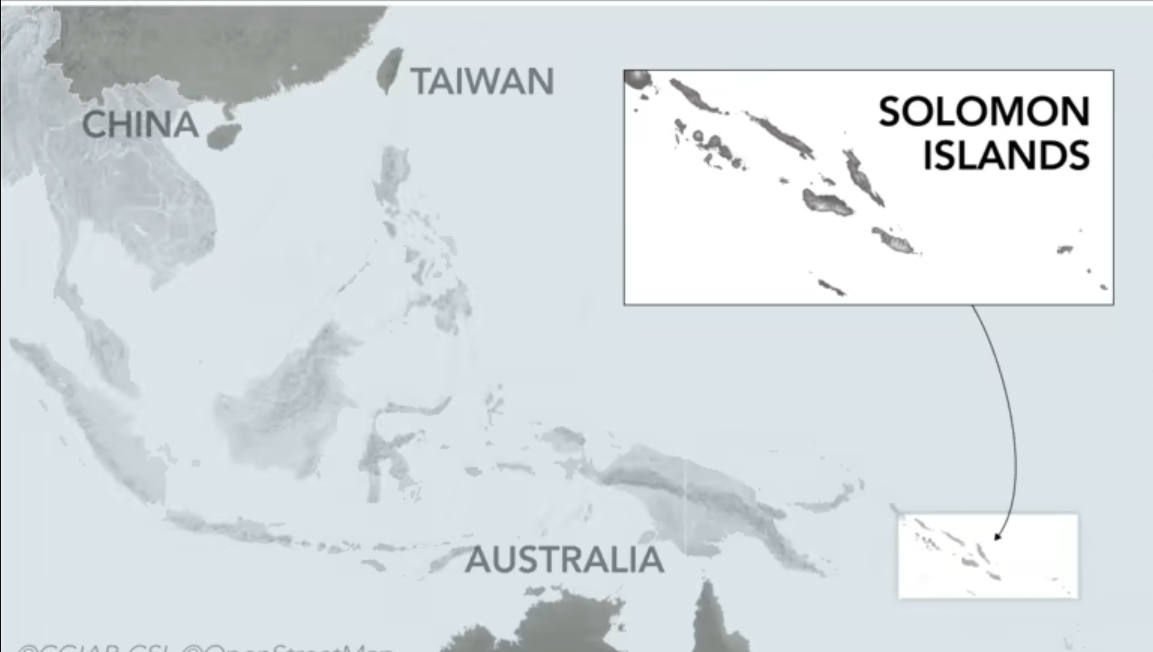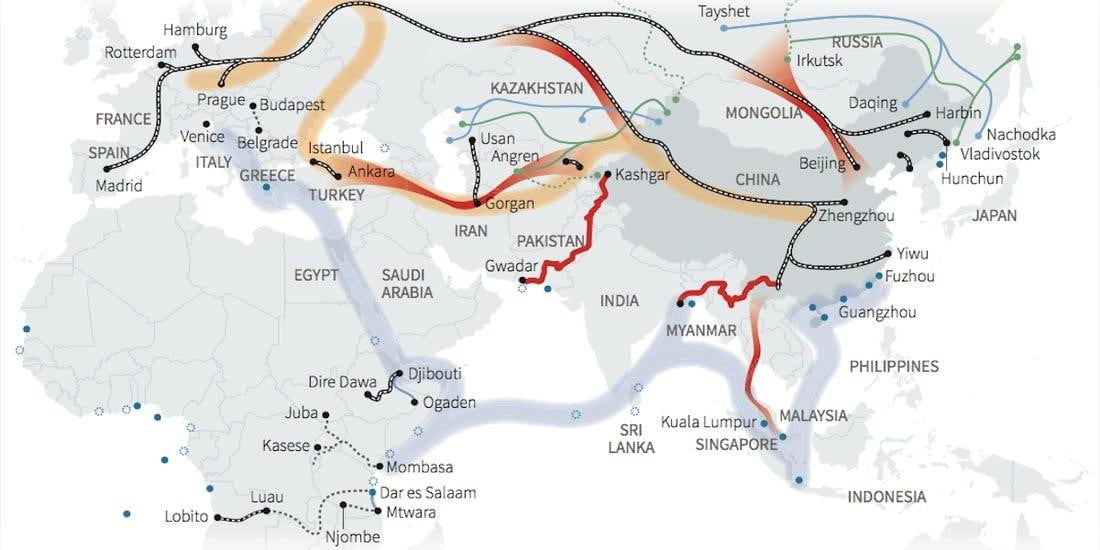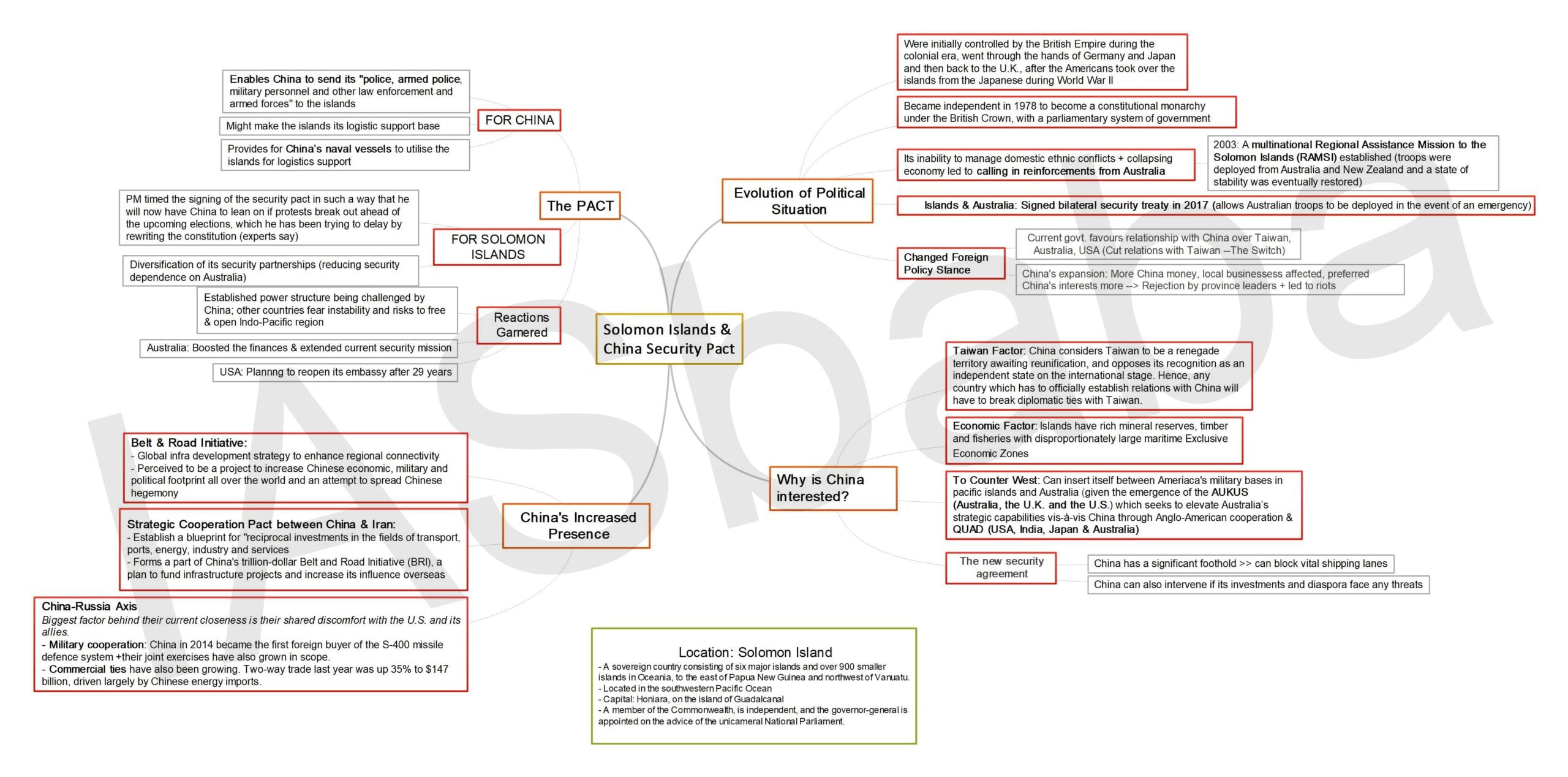Baba’s Explainer, International Relations
Solomon Islands and China Security Pact
General Studies – 2
- Bilateral, Regional and Global Groupings and Agreements involving India and/or affecting India’s interests.
- Effect of Policies and Politics of Developed and Developing Countries on India’s interests, Indian Diaspora.
Why in News: China and the Solomon Islands finalised a controversial security agreement, an early draft of which was leaked online in March 2022.
- This is the first deal of its kind for Beijing in the Pacific region.
- It has now become the centre of tussle between China and West for enhancing their own diplomatic presence in the region.

Where is Solomon Islands located?
- The Solomon Islands is a sovereign country consisting of six major islands and over 900 smaller islands in Oceania, to the east of Papua New Guinea and northwest of Vanuatu.
- It is located in the southwestern Pacific Ocean.
- It consists of a double chain of volcanic islands and coral atolls in Melanesia.
- Melanesia is a subregion of Oceania in the southwestern Pacific Ocean.
- Its capital, Honiara, is located on the largest island, Guadalcanal.
- The island is a constitutional monarchy, with the British monarch, represented by a governor-general, serving as the formal head of state.
- Still, the country, a member of the Commonwealth, is independent, and the governor-general is appointed on the advice of the unicameral National Parliament.
How has the political situation in Solomon Islands evolved over the years?
- The islands, which were initially controlled by the British Empire during the colonial era, went through the hands of Germany and Japan and then back to the U.K. after the Americans took over the islands from the Japanese during World War II.
- It was here, in the capital city of Honiara on the island of Guadalcanal, that some of the fiercest battles of World War II were fought between the US and Japanese troops.
- The islands became independent in 1978 to become a constitutional monarchy under the British Crown, with a parliamentary system of government.
- Nevertheless, its inability to manage domestic ethnic conflicts led to close security relations with Australia, which is the traditional first responder to any crisis in the South Pacific.
- Between the late 1990s and early 2000s, the country was rife with ethnic unrest and military conflict between several armed groups, ultimately resulting in a coup that brought present Prime Minister Sogavare to power for the first time.
- With its economy in a state of near-collapse and ethnic clashes still rampant, the Pacific Nation was forced to call in reinforcements from Australia to stabilise state affairs.
- In 2003, a multinational Regional Assistance Mission to the Solomon Islands (RAMSI), led by Australia, was established. As part of the mission, troops were deployed from Australia and New Zealand and a state of stability was eventually restored.
- But political instability continues to persist, making it difficult for new governments to stick around.
- Despite attempts by PM Sogavare to expel the RAMSI mission, it managed to remain in the country for well over a decade.
- Solomon islands and Australia also normalised a bilateral security treaty in 2017, which allows Australian troops to be deployed in the island nation in the event of an emergency.
What has been the change in Solomon Islands’ foreign policy stance in recent years?
- The government under PM Sogavare’s started having close relationship with China in recent years
- Soon after he was elected prime minister once again in 2019, he cut the country’s long-standing diplomatic relations with Taiwan in favour of China.
- This decision, widely known as ‘The Switch’, is said to have been one of the first major indications of China’s expanding influence in the region, which was traditionally an ally of the US and Australia.
- This was supposedly after Beijing offered half a billion U.S. dollars in financial aid, roughly five times what Taiwan spent on the islands in the past two decades.
- As the money from China flowed in, so did the adverse impact to the local population from Chinese businesses, Chinese labourers for Chinese infrastructure projects, as well as a perceived preferential treatment for Chinese interests.
- PM Sogavare’s Switch decision was not popular — several province leaders rejected the switch, and it was also one factor contributing to the riots at capital Honiara in late 2021.
- Strikingly, these riots targeted Chinese assets in addition to government property.
Why is China interested in the Solomon Islands?
- Taiwan factor
- The Pacific islands are among the few regions in the world where China has competition from Taiwan for diplomatic recognition.
- China considers Taiwan to be a renegade territory awaiting reunification and opposes its recognition as an independent state on the international stage.
- Hence, any country which has to officially establish relations with China will have to break diplomatic ties with Taiwan.
- The Solomon Islands was one among the six Pacific island states which had official bilateral relations with Taiwan. However, in 2019, the Solomon Islands, along with Kiribati, switched allegiance to China.
- Economic reasons
- Solomon Islands, in particular, have significant reserves of timber and mineral resources, along with fisheries.
- Moreover, these states have disproportionately large maritime Exclusive Economic Zones when compared to their small sizes, the reason why these ‘small island states’ are seen also seen as ‘big ocean states’.
- With the new security agreement, China and its army have a foothold in the island nation, which could be significant for blocking vital shipping lanes.
- The agreement could also potentially help China intervene when its foreign investments and diaspora face threats in the region.
- Strategic reasons – To Counter West
- The small Pacific island states act as potential vote banks for mobilising support for the great powers in international fora like the United Nations.
- More importantly, the islands are strategically located for China to insert itself between America’s military bases in the Pacific islands and Australia.
- This is especially significant in the current scenario, given the emergence of the AUKUS (Australia, the U.K. and the U.S.) which seeks to elevate Australia’s strategic capabilities vis-à-vis China through Anglo-American cooperation.
- The coming together of QUAD (USA, India, Japan and Australia) which is targeting China by trying to encircle has also created fears among Chinese diplomatic establishment. Thus, China wants to counter these western moves by signing security arrangements with countries in the region.
- Nonetheless, the anti-China nature of the 2021 riots in Honiara turned out to be the immediate trigger for Beijing to ramp up its security cooperation with the Solomon Islands.
What is in the Solomon Islands-China pact?
- The leaked document explicitly enables China to send its “police, armed police, military personnel and other law enforcement and armed forces” to the islands
- on the Solomon island government’s request, or
- if China sees that the safety of its projects and personnel in the islands are at risk.
- It also provides for China’s naval vessels to utilise the islands for logistics support.
- There have been speculations that China might be building its next overseas naval base in the Solomon Islands after Djibouti, which was also incidentally referred to as a logistics support base.
- PM Sogavare explained in Parliament that the deal was guided by national interests and denied allegations that China plans to set up a military base in the country in the long term.
What is in it for Solomon Islands?
- Some experts have said that the prime minister timed the signing of the security pact in such a way that he will now have China to lean on if protests break out ahead of the upcoming elections, which he has been trying to delay by rewriting the constitution
- Solomon Island government has stated the diversification of its security partnerships (reducing security dependence on Australia) as one of the reasons for signing this deal.
What does this mean for the established geopolitical configuration in the region?
- The Pacific islands, in the post-World War II scenario, were exclusively under the spheres of influence of the Western powers, in particular, the U.S., U.K., France and the regional heavyweights, Australia and New Zealand.
- All of them have territorial possessions in the region, with the three nuclear powers among them having used the region as a nuclear weapons testing ground.
- The smaller island nations of the region are heavily dependent on them, especially Australia as it is a resident power.
- This established power structure in the region is being increasingly challenged by China through the steady displacement of Taiwan and the cultivation of economic and political clout.
- China’s deal with the Solomon Islands has added a security dimension to its fast-growing profile in the region.
How has the west reacted to this agreement?
- Australia in particular has been very critical of the new security pact. Australian PM claimed that the pact pointed towards “intense pressure” from China in the Pacific island nation.
- Australia is concerned about the lack of transparency with which this agreement has been developed, noting its potential to undermine stability in our region
- Australia, the US, New Zealand and Japan said they “shared concerns about the security framework and its serious risks to a free and open Indo-Pacific”.
- Australia has reacted with boosted finances, and by extending its current security mission till 2023 when the islands will host the Pacific Games.
- The U.S. has responded by considering reopening its embassy in the islands after a long 29-year gap. US has laid out in unusually blunt terms a plan to increase its influence in the South Pacific nation before China becomes “strongly embedded.”
- New Zealand has shed its typical restraint about China and has criticised it for attempting to militarise the Pacific islands.
What are the other moves of China which shows its increasing role in world affairs?
1. China through its Belt and Road initiative (BRI) is trying to increase its presence across the globe more specifically in Asia and Indo-Pacific region.

- BRI is a global infrastructure development strategy adopted by the Chinese government in 2013 to invest in nearly 70 countries and international organizations.
- The ‘Belt’ refers to the ‘Silk Road Economic Belt’, which is a series of overland routes reminiscent of the Silk Road of antiquity and the late middle ages, while the ‘Road’ refers to the sea routes, which is also referred to as the 21st Century Maritime Silk Road.
- The initiative was incorporated into the Constitution of China in 2017. The Chinese government calls the initiative “a bid to enhance regional connectivity and embrace a brighter future.”
- The BRI project has a target completion date of 2049, which will coincide with the centennial anniversary of the People’s Republic of China
2. China and Iran have signed a 25-year “strategic cooperation pact” which includes “political-economic and strategic components”.
- It will deepen relations between Iran and China and would establish a blueprint for “reciprocal investments in the fields of transport, ports, energy, industry and services.”
- It forms a part of China’s trillion-dollar Belt and Road Initiative (BRI), a plan to fund infrastructure projects and increase its influence overseas.
3. Development of the China-Russia Axis
- Last year, Russia’s Foreign Minister described relations as the “best in their entire history”.
- It is stated that new inter-State relations between Russia and China are superior to political and military alliances of the Cold War era.” Both countries have also added that the relationship “has no limits” and “there are no forbidden areas of cooperation”.
- The biggest factor behind their current closeness is their shared discomfort with the U.S. and its allies.
- There is also the ideological binding glue in shared opposition to what both countries described as the west’s “attempts to impose their own democratic standards on other countries” and “interference” by the west on human rights issues”.
- The growing closeness has also been reflected in military cooperation. China in 2014 became the first foreign buyer of the S-400 missile defence system, which India has also purchased (although there have been reported delays in delivery for reasons unknown). Also, their joint exercises have also grown in scope.
- Commercial ties have also been growing. Two-way trade last year was up 35% to $147 billion, driven largely by Chinese energy imports. China has been Russia’s biggest trading partner for 12 consecutive years and accounts for close to 20% of Russia’s total foreign trade (Russia, on the other hand, accounts for 2% of China’s trade).
Mains Practice Question – Analyse the geopolitical implications of the recent Chinese security cooperation agreement with the Solomon islands.
Note: Write answers to this question in the comment section
Mind Map

DOWNLOAD MIND MAP – CLICK HERE











